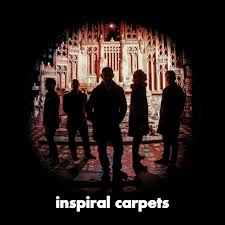Having formally reissued their 1987 demo tape Dung 4 earlier in the year, the Inspiral Carpets, on their new self-titled album, almost seem to have found a sequel to that release just sitting around their archive. Which isn’t meant to be dismissive at all – if anything the Inspirals’ first full studio album in two decades is almost the culmination of an alternate timeline for the band as a whole. When Stephen Holt left halfway through the sessions of the first album Life, replaced by Tom Hingley, nobody could have guessed he’d end up replacing Hingley in turn in 2011. But after the sometimes almost too crisply clean work of their Mute years all that time back, what’s especially thrilling about Inspiral Carpets is that it is a thrill, the kind of quick, near chaotic but never messy romp that sounds both like the start of the band three decades back and their even earlier spiritual roots two decades before that – wild and frenetic garage moves with harder soul and mod underpinnings.
From the start, with the quick fade in and sharp delivery from Holt on ‘Monochrome’, everything feels immediate and there, no messing around. Clint Boon’s keyboards remain a key part of everything, at once celebratory and a series of near fanfares, but it’s also a treat just to hear how Martyn Walsh’s bass and Craig Gill’s drums are all about making you want to dance – the moves and feelings may be anything but what’s new and now, but compared to where too many bands with members in their fifties can be, this actually feels fun and anything but forced. The secret weapon that the band always had, though, is just how sweetly yearning the songs could be at the same time – and Holt’s warm voice and slice-of-life lyrics on love, life and memories match with Graham Lambert’s guitars in particular to make that work. ‘Spitfire’ is a great example, Holt on the chorus stretching out his vocals just enough while Lambert’s gentle melodies ride the energetic arrangement beautifully. When Boon takes over on the breaks it’s a lovely contrast in turn, then when Lambert adds in another melody towards the end it’s a killer touch.
The slight downside to the album is that it almost never stops to breathe as it goes, with the slower flow of ‘Flying Like A Bird’ bringing in the first full change six songs in. It’s hardly that nearly everything else completely clones itself song for song, but you can almost pick any song and get the same feeling from it, making it a little hard for individual moments to stand out. But they’re there, whether it’s Holt’s understated intensity on ‘You’re So Good For Me’, a neat lyrical moment like "The click-clack cans of Coca-Cola/Sounds like a soundtrack from Morricone" on ‘Changes’, the slow burn rumbling rhythm on the closing ‘Human Shield’ – Walsh really bringing a nasty strong punch to things – or Boon’s shimmering lead-in and chorus melody on ‘A To Z Of My Heart’ and frenetic jamming on ‘Forever Here’.
Yet what’s ultimately a key sign is how it’s less about any individual performance than it is the whole – the band’s self-production really carries across how it all interlocks, everything seems to have less been written than just spontaneously there. It’s an aural illusion, sure, but they get it exactly right.
The penultimate song ‘Let You Down’, meanwhile, gets in fellow Manchester performing veteran John Cooper Clarke for a midsong turn that almost feels like a vindication, survivors still doing their thing after all this time. Meantime the liner notes from all five members, each expressing their own gentle astonishment on how it’s all come this far and often talking about they recorded the album in bursts and batches in between living their day to day lives, helps underscore what an unlikely but enjoyable album this is in the end; the type of thing that feels like a band just doing their thing down the street each night for the hell of it. Hell of a good time, and here’s to more of it.
<div class="fb-comments" data-href="http://thequietus.com/articles/16453-inspiral-carpets-inspiral-carpets-review” data-width="550">


